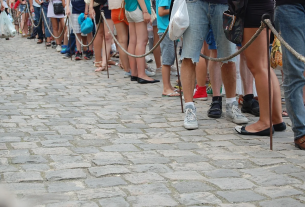Israelis are bracing for what may be their most depressing holiday season in the nation’s short history. This will be for both religious reasons and commercial ones. American Jews tend to see the High Holidays as depressing since they spend all day in synagogue listening to sermon about sin and redemption. For the majority of Israelis, however, the time in the synagogue and hearing the shofar blasts on Rosh Hashana is a celebration. They also travel to visit their families and secular Israelis take the opportunity to hit the beaches or hang out in night clubs.
Meanwhile the government has already listed 30 different towns and cities, mostly Haredi and Arab, as Covid-19 hot zones with special shutdown restrictions. Statistics show that more than 20% of all Corona Virus infections have occurred among the religious sector in Israel. The government says that more than 80% of new cases have been in the Hardei community since the second wave started.
So why will Rosh Hashana and the three weeks of holidays to start the year 5781 be different from all other years? Because of the Corona restrictions already in place many businesses will need to be closed. Synagogues are looking at tough restrictions and so will not be able to hold large crowds.
Israel’s Hasidic Bratslaver sect is already angry over the closure of Ukraine to tourists as they make an annual pilgrimage to their Rebbe’s grave in that country on Rosh Hashana.
Now there is talk of a total closure just like the one held on Passover. This would mean that all public transportation between cities would be suspended from the day before and travel in private cars by highway will be restricted over the holiday. Also, any and all places of entertainment usually open on Shabbat and holidays will need to be closed.
So what about synagogue services? The Israeli government has already published a new set of guidelines for the holiday services and is warning that these may need to be hardened if Corona Virus cases continue to increase.
An indoor service can only be held in a synagogue with at least 40 square meters (400 square feet) and be limited to one person to every 4 square meters of space. Areas will need to have physical separations.
As for any outdoor services, the area must also be divided physically into different sections and each area would be limited to 20 people.
Meanwhile, Israel’s economy is already taking a big hit due to the lack of foreign tourism. The country is usually filled wish Jewish pilgrims from around the world who fill the hotels and spend money in restaurants and other places of entertainment. Also, during the week of Sukkot Christian pilgrims from around the world come to Jerusalem and hold an annual parade. This will not be happening this year.
The Israeli government is really in a damned if they do, damned if they don’t predicament this year. Many Haredim will rebel against any tough restrictions on synagogue services over the holidays. And Israeli merchants are already in trouble and may not survive another shutdown. But no shutdown could mean a huge spike in Covid-19 cases.




